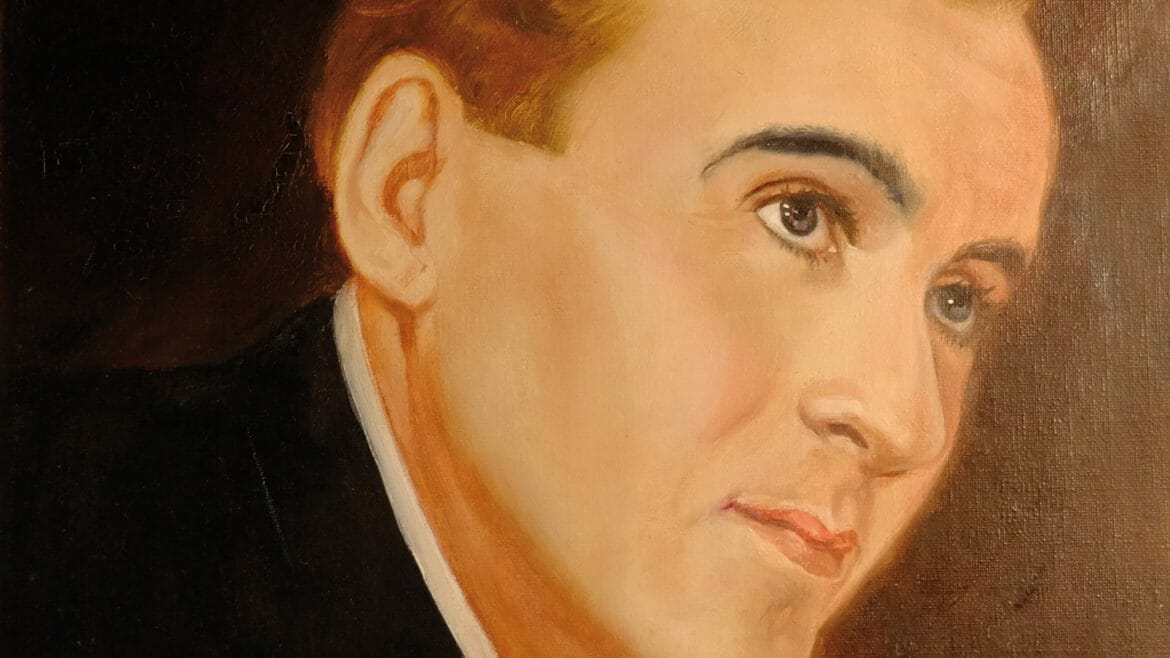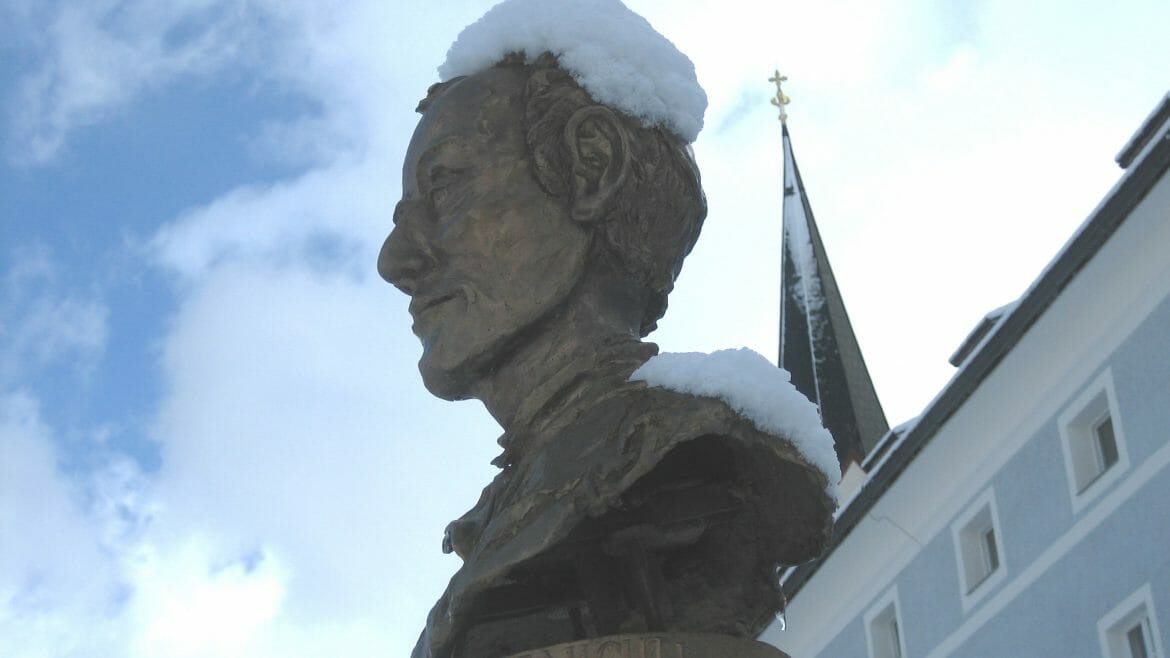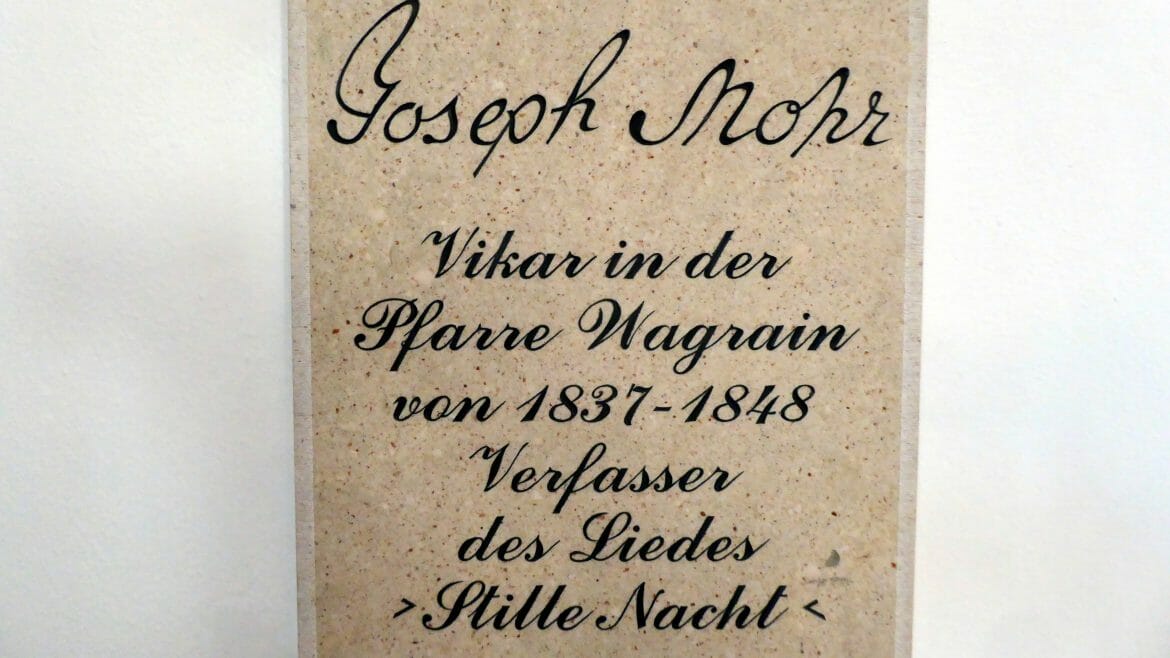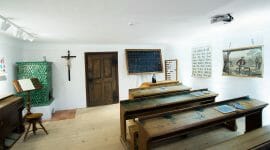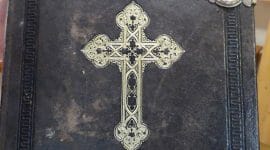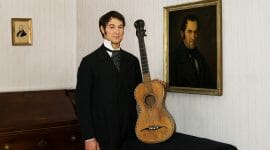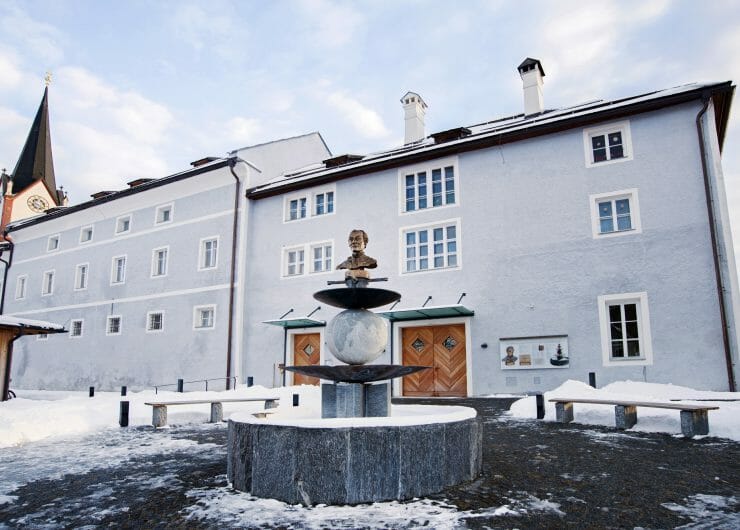
Childhood and adolescence from 1792 to 1815 in the city of Salzburg
Joseph Franz Mohr was born in Salzburg as a child out of wedlock on 11 December 1792. His mother was the knitter Anna Schoiber, born in Hallein. His father, whose family was from Mariapfarr in Lungau, was named Franz Mohr and had been a soldier in the service of Archbishop Colloredo in the Archbishopric of Salzburg. He deserted in the year that Joseph Mohr was born. Children out of wedlock were a “crime” at this time: Although they were permitted to carry the name of their father, they were stigmatized from birth. And thus, Joseph Wohlmut, Salzburg’s final executioner, who was trying to improve his negative reputation by serving as a godfather to illegitimate children, became Mohr’s godfather. However, he had somebody else substitute for him during Mohr’s baptism.
A clerical career for a highly talented boy
Joseph Mohr grew up with his mother, his grandmother and his stepsister Klara and an additional relative at a house at the cold and dark Steingasse 31. The street was located next to a wet boulder of the Kapuzinerberg mountain and made for a miserable accommodation — cold, bleak and more than unsuitable for the healthy development of a child.
It soon became apparent that the boy was very talented and particularly intelligent. The choir vicar Johann Nepomuk Hiernle discovered his talents early on: He made it possible for him to visit the academic gymnasium and supported and taught Mohr, becoming a father figure and role model. At the same time, the boy assisted as a singer and violinist at the university’s choirs and at St. Peter’s Abbey, Salzburg. Between 1808 and 1810, he studied philosophy at Kremsmünster Abbey in Upper Austria. After completing school in 1811, he joined the priestly seminary in the city of Salzburg at the age of 19. As a child born out of wedlock, he required special permission from the church to do so. In 1815, the only 23-year-old was ordained as a priest. This, however, also required special permission as he had not yet reached the required age of 25.
b
The famous poem was created in the pilgrimage town of Mariapfarr in 1816
In 1815, Joseph Mohr began his first official position as an assistant priest: in Mariapfarr in Lungau, the hometown of his family on his father’s side. The building where his father was born, the ancient “Scharglerkeusche”, still stands here today. The 12th-century church called “Zu unserer Lieben Frau” (To our beloved woman) in Mariapfarr has been one of the best-known pilgrimage sites in SalzburgerLand for ages. The iconic painting of the beautiful Madonna and the adoring three kings has led contemporary “Silent Night” researchers to suspect that it may have been Mohr’s inspiration for the six-verse Christmas poem that the young priest wrote in Mariapfarr in 1816: The line “Holy infant, so tender and mild” certainly reminds of the curly blonde Baby Jesus depicted on the painting. However, Mohr was not able to cope with Lungau’s rough climate and fell ill in 1817, forcing him to move to a much milder part of Salzburg — to Oberndorf at the Salzach river.
From in 1817, Joseph Mohr is an assistant priest and coadjutor in Oberndorf
On 25 August 1817, Joseph Mohr became an assistant priest in Oberndorf. The new parish, separated from Laufen by the Salzach river, did not have a vicarage. Thus, Mohr lived in a room in the sacristan house and ate at the village taverns. In Oberndorf, he quickly became friends with the teacher Franz Xaver Gruber, who was five years older than him and came from the nearby located Arnsdorf and oversaw the choir and the organ at the St. Nikola Church in Oberndorf. The young and brilliant Mohr and his popularity among the people turned out to be a bit of a pickle for the vicar and Mohr’s superior George Heinrich Nöstler. He accused him of singing “uplifting songs” and “joking around with members of the opposite sex.” The clerical authorities from Salzburg did not make much of the accusations, however. On the contrary: The city of Salzburg considered Mohr so eloquent and theologically well-versed, that he was invited to the Salzburg Cathedral as a Lenten preacher in 1819 — a great honour for the only 27-year-old assistant priest.
“Silent Night” is performed for the first time in 1818 in Oberndorf
During Christmas of 1818, Joseph Mohr asked his friend Gruber for a fitting melody for his poem that he had composed in 1816 in Mariapfarr. Following the Christmas mass, “Silent Night” was performed for the very first time, sung by the two friends and accompanied by Joseph Mohr with the guitar. For the longest time, it was assumed that the guitar was merely a substitute for the defective organ: However, it is much more likely that Mohr had always intended to use the guitar as the accompanying instrument, as the song was sung in the church room in front of the nativity scene after mass had already been completed.
In September 1819, Joseph Mohr left Oberndorf again. Throughout the rest of their lives, Franz Xaver Gruber and Joseph Mohr maintained a strong friendship. Gruber dedicated a farewell song to his friend when he left Oberndorf. The young assistant priest is said to have been moved to tears. Mohr ended up visiting Franz Xaver Gruber several times in Hallein.
Eloquent, caring, unconventional: years of travel from 1815 to 1827
The next few years were spent by the young clergyman from Salzburg living an unsteady life in service of the church. As a coadjutor, in other words, an assistant to more highly positioned priests, he worked in places such as Anthering, Golling, Kuchl, Eugendorf, Oberndorf and Bad Vigaun. When he was promoted to provisional vicar, he worked in Hof and Hintersee. There, he received his first position as a vicar. For the first time in his life, he remained at his post for nearly nine years until he was moved to be the vicar in Wagrain in 1837: his final location before his early death in 1848.
From 1837, Joseph Mohr completes his life’s work as a social reformer in Wagrain
Thanks to Mohr’s initiative, a school was built in Wagrain for more than a hundred children where there had previously just been a single classroom. Mohr also founded a compensation fund in order to enable children of impoverished parents to go to school. The later created home for poor and elderly people is also a result of his efforts. On 4 December 1848, nearly 30 years after the first performance of his song, the lyricist died of his lung problems, probably exacerbated by an infection triggered by a winter walk. His only estate was his guitar, which later came to be owned by Franz Xaver Gruber’s family. The “Priest of the Poor” never witnessed the success that his Christmas song would have throughout the world.


